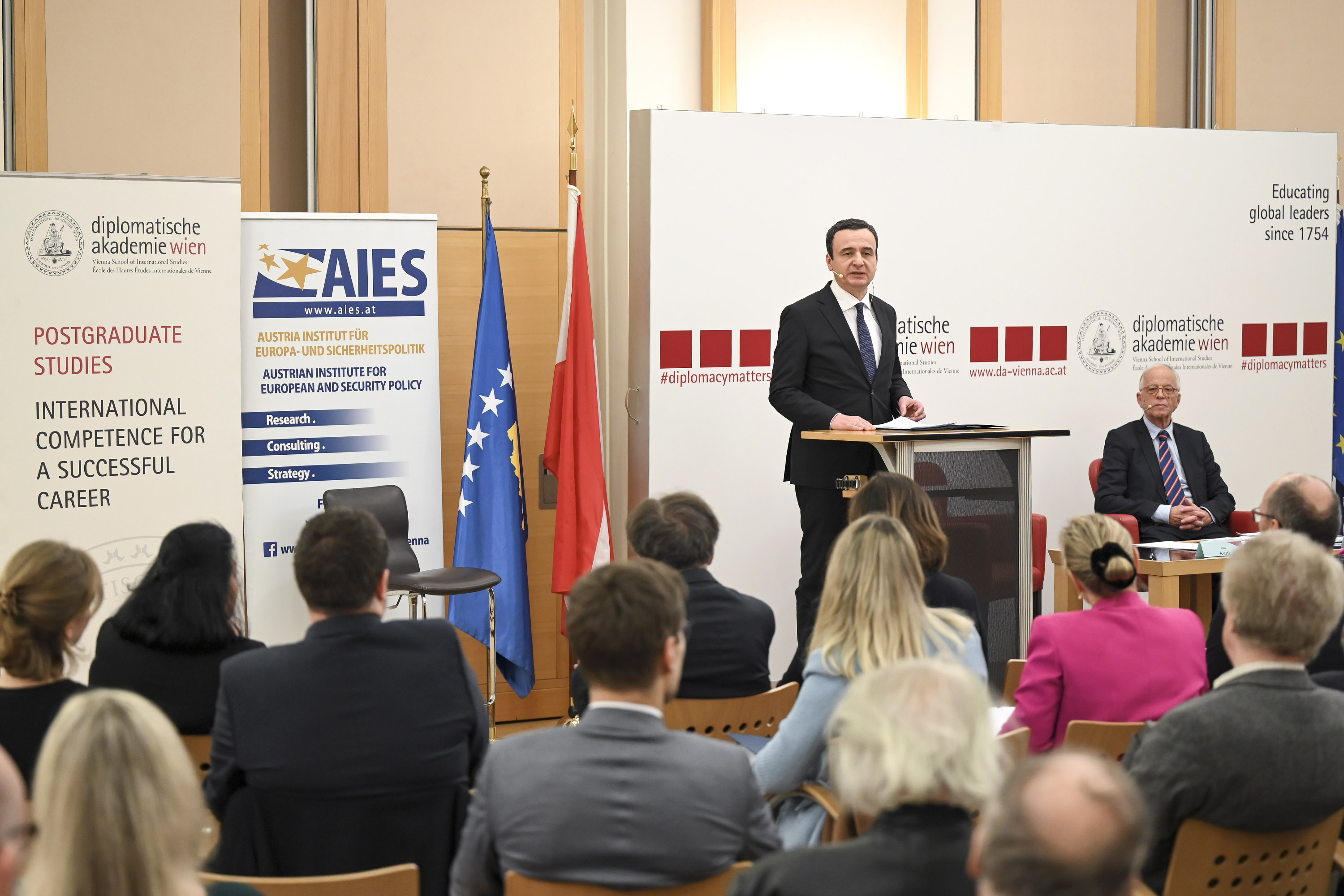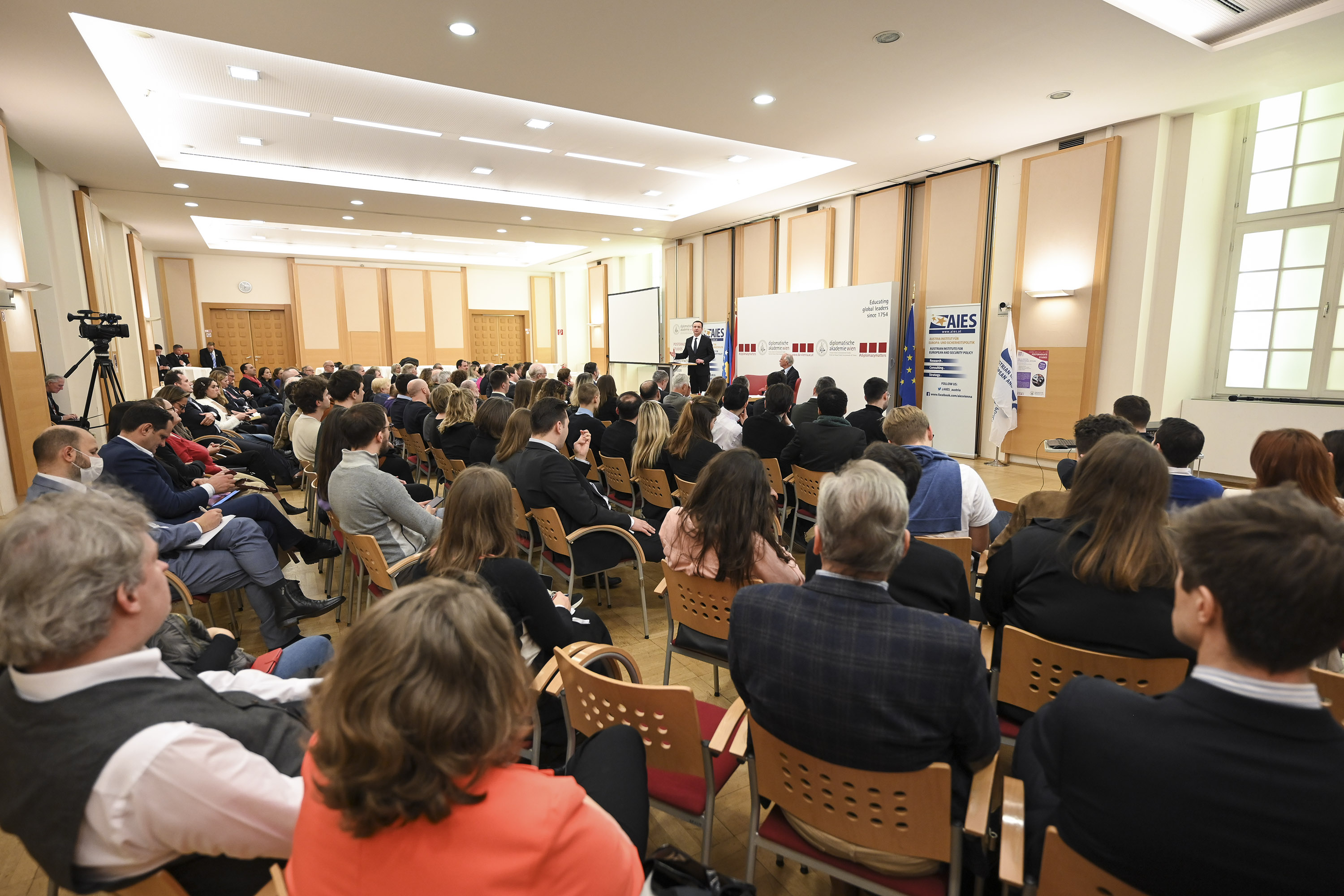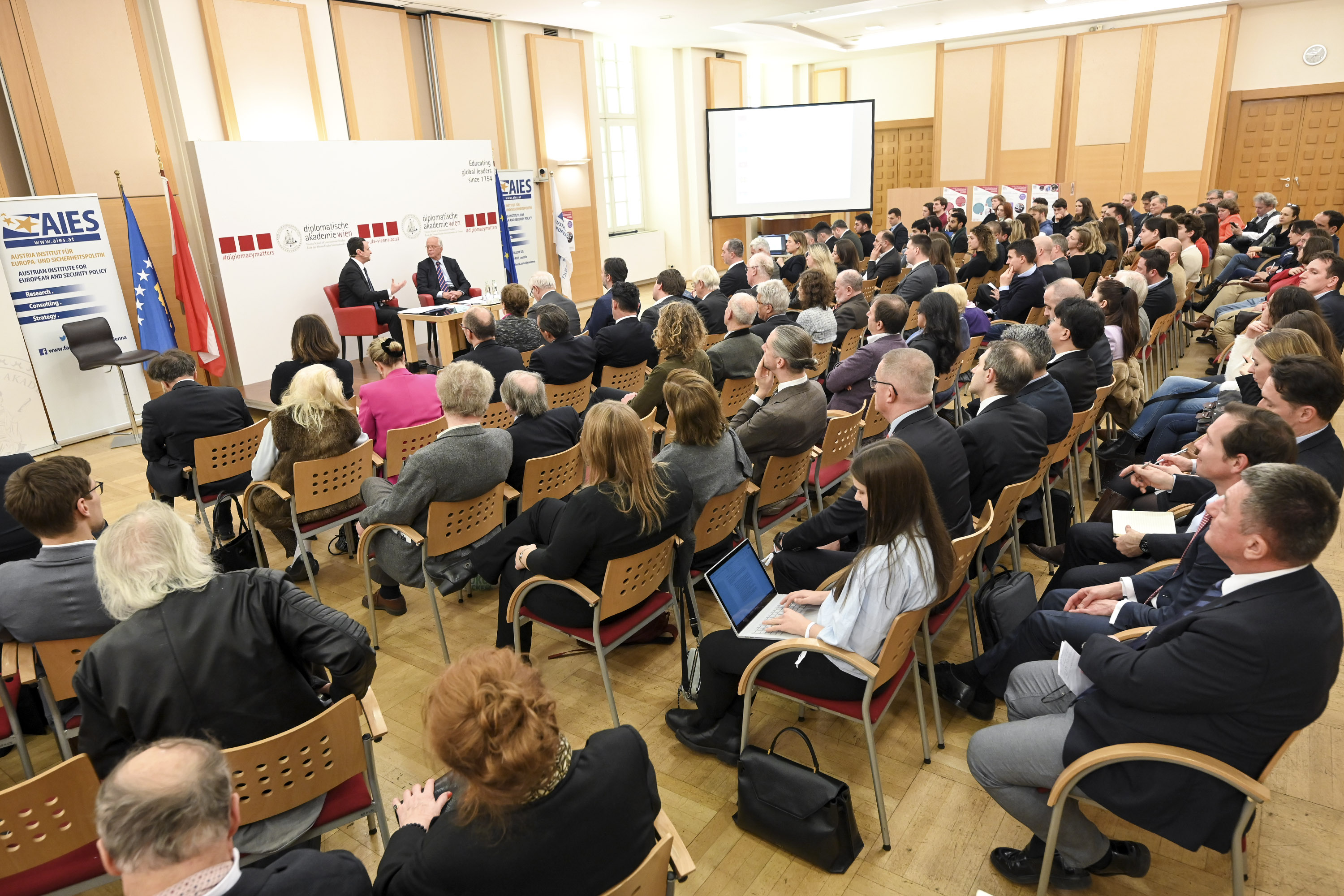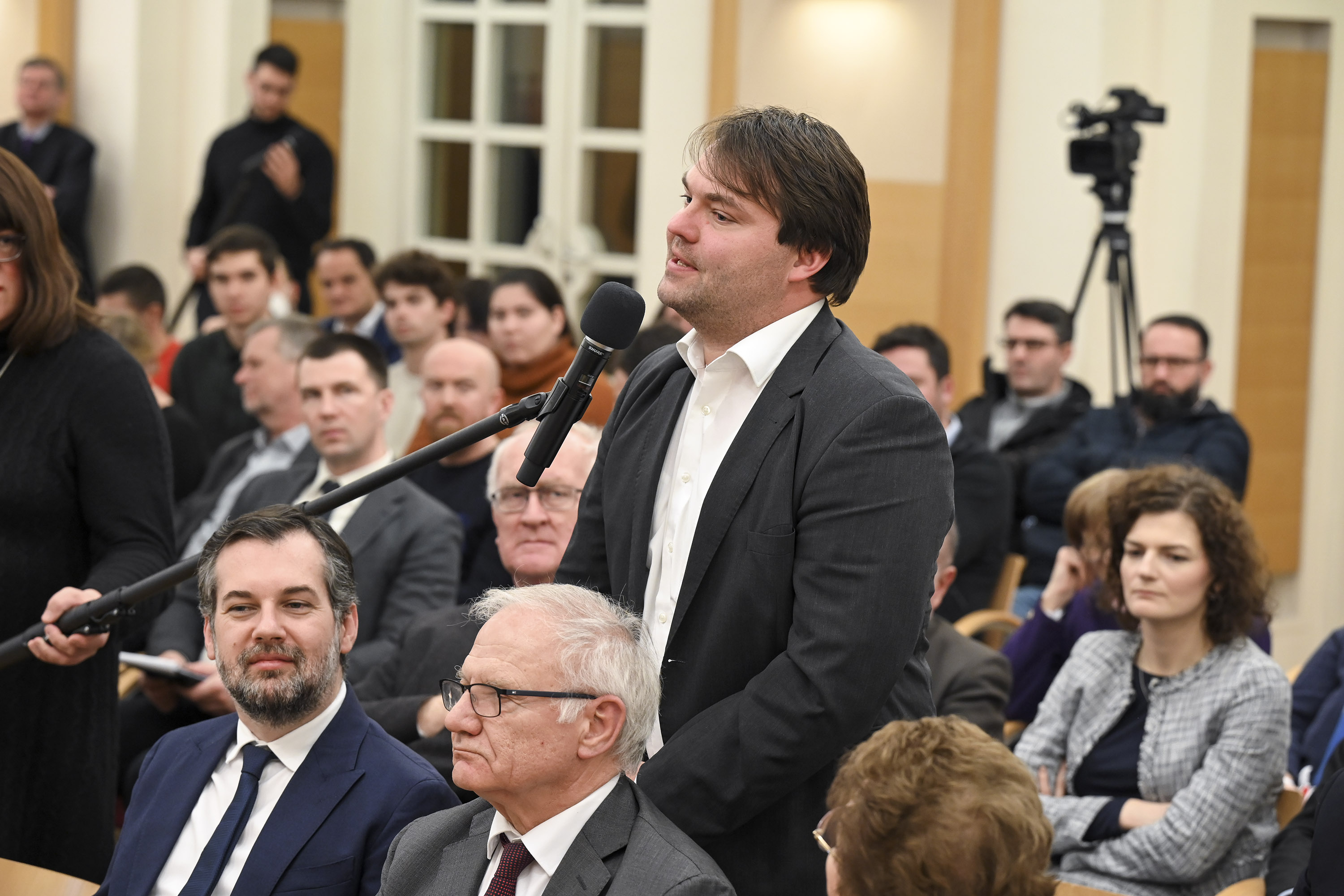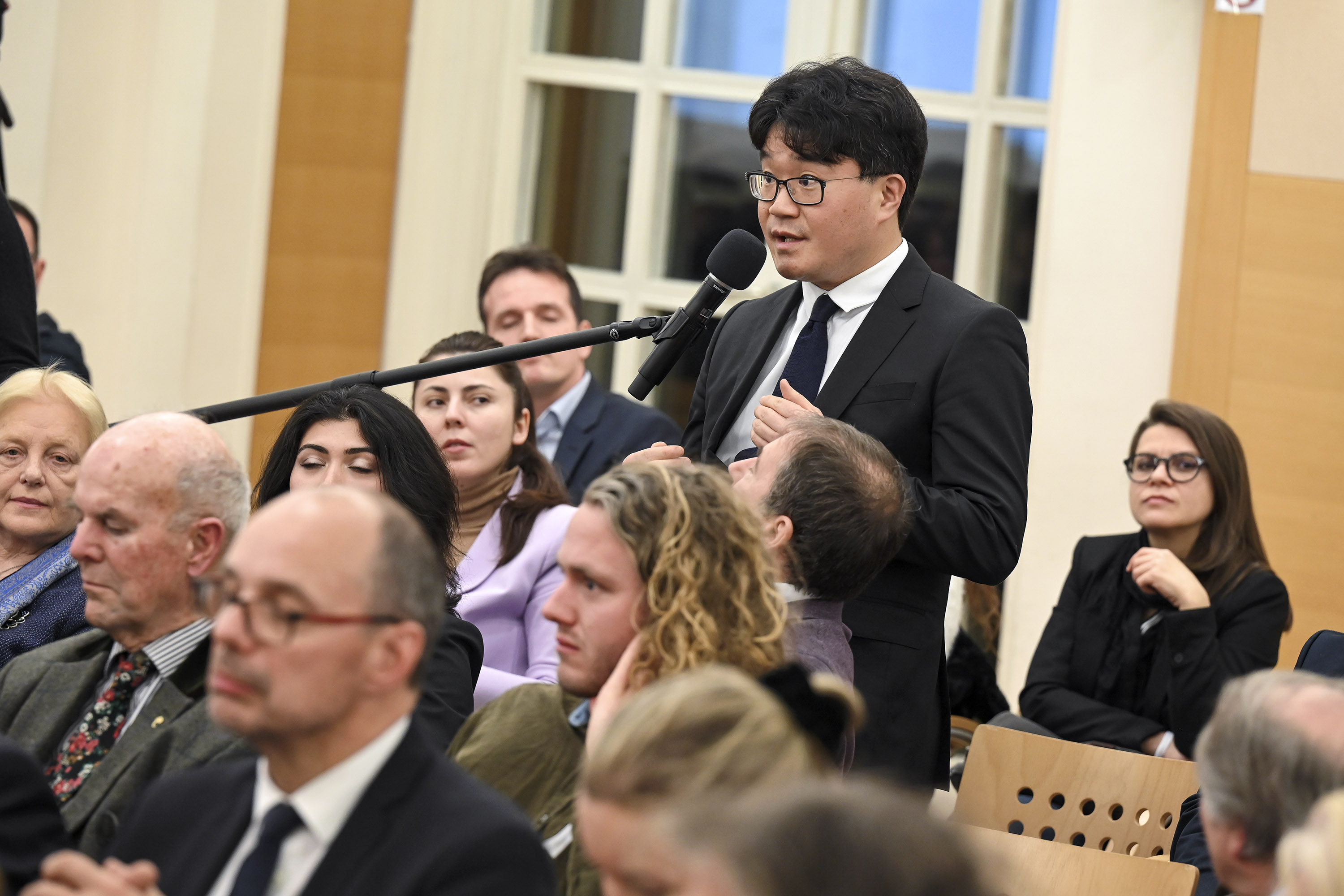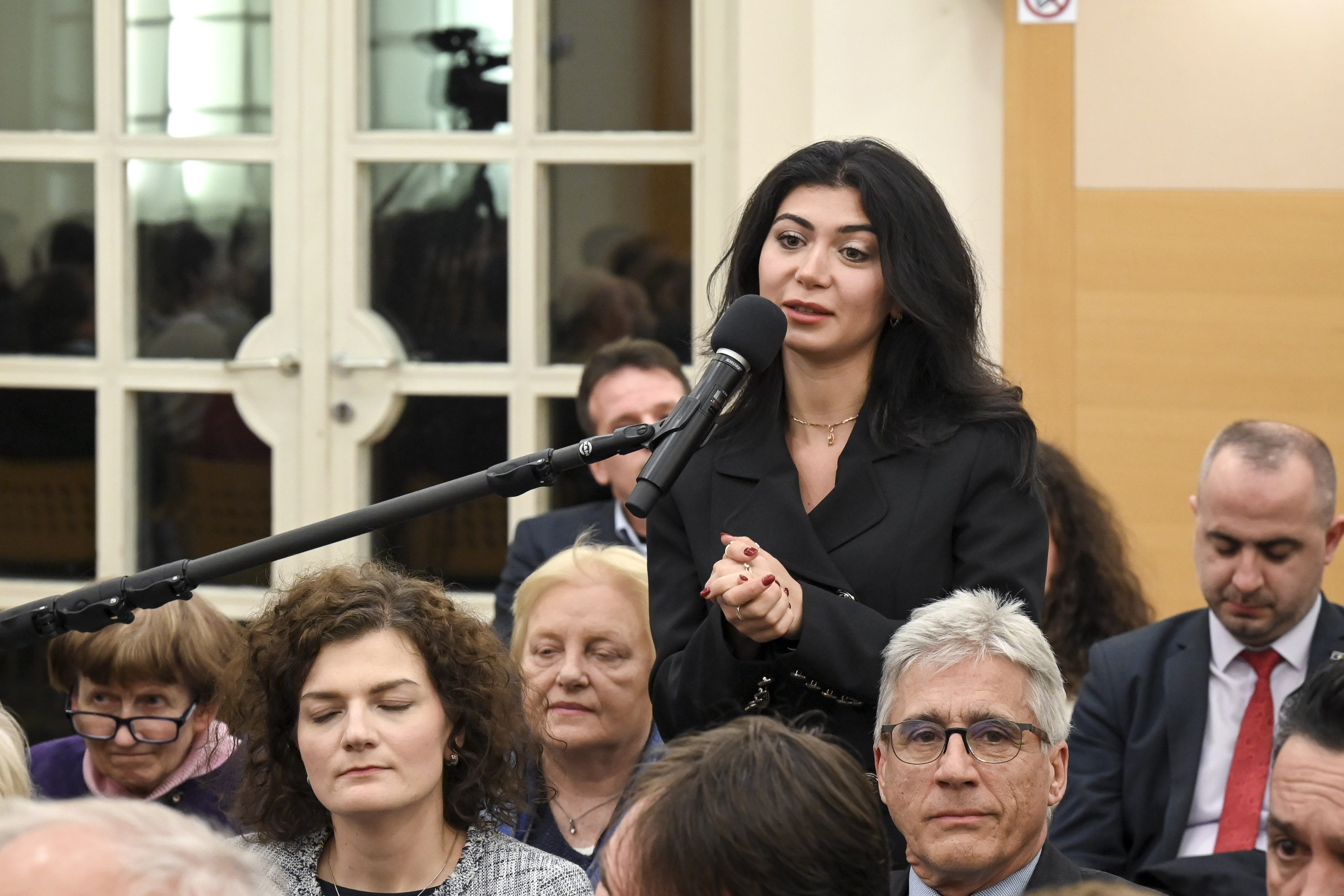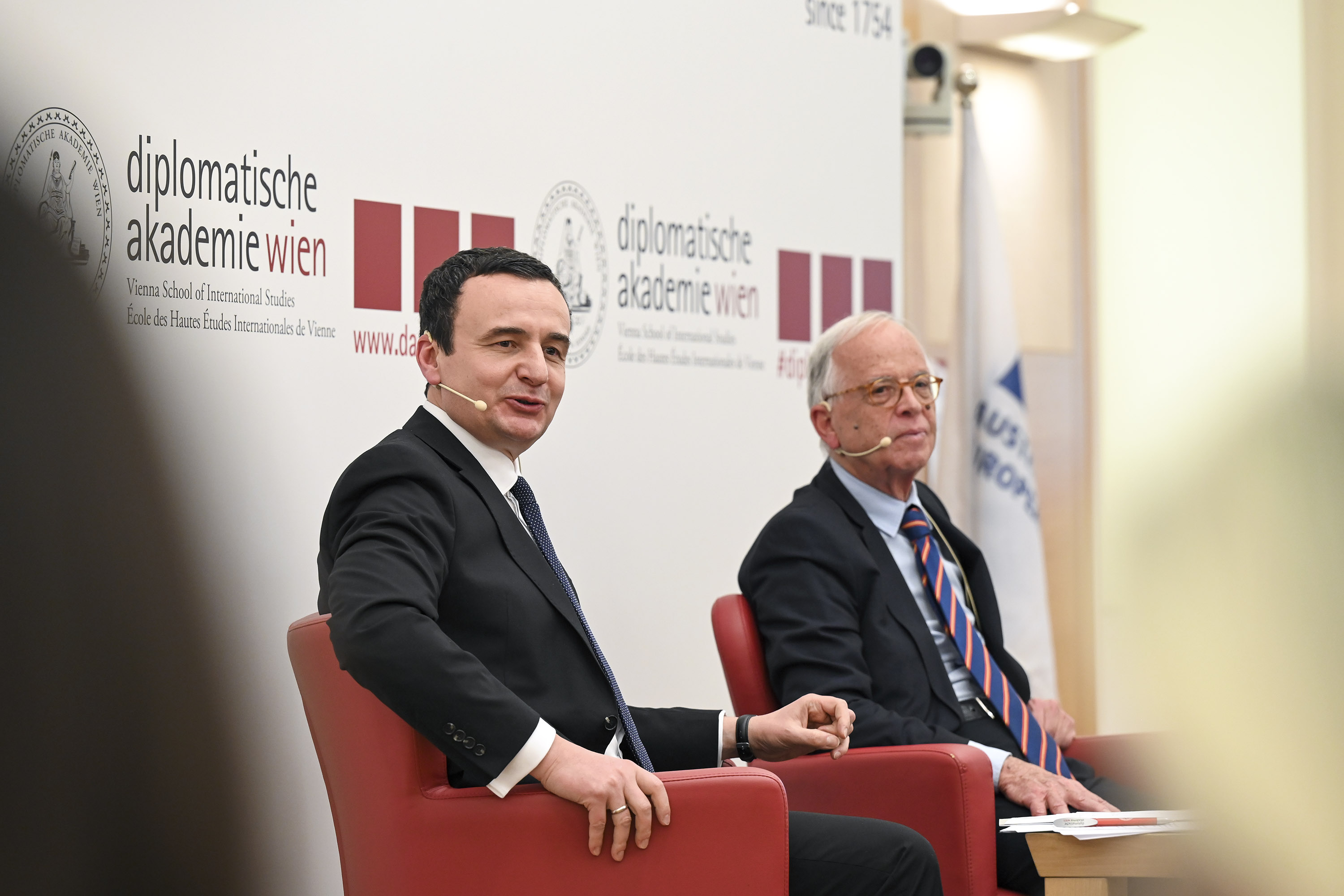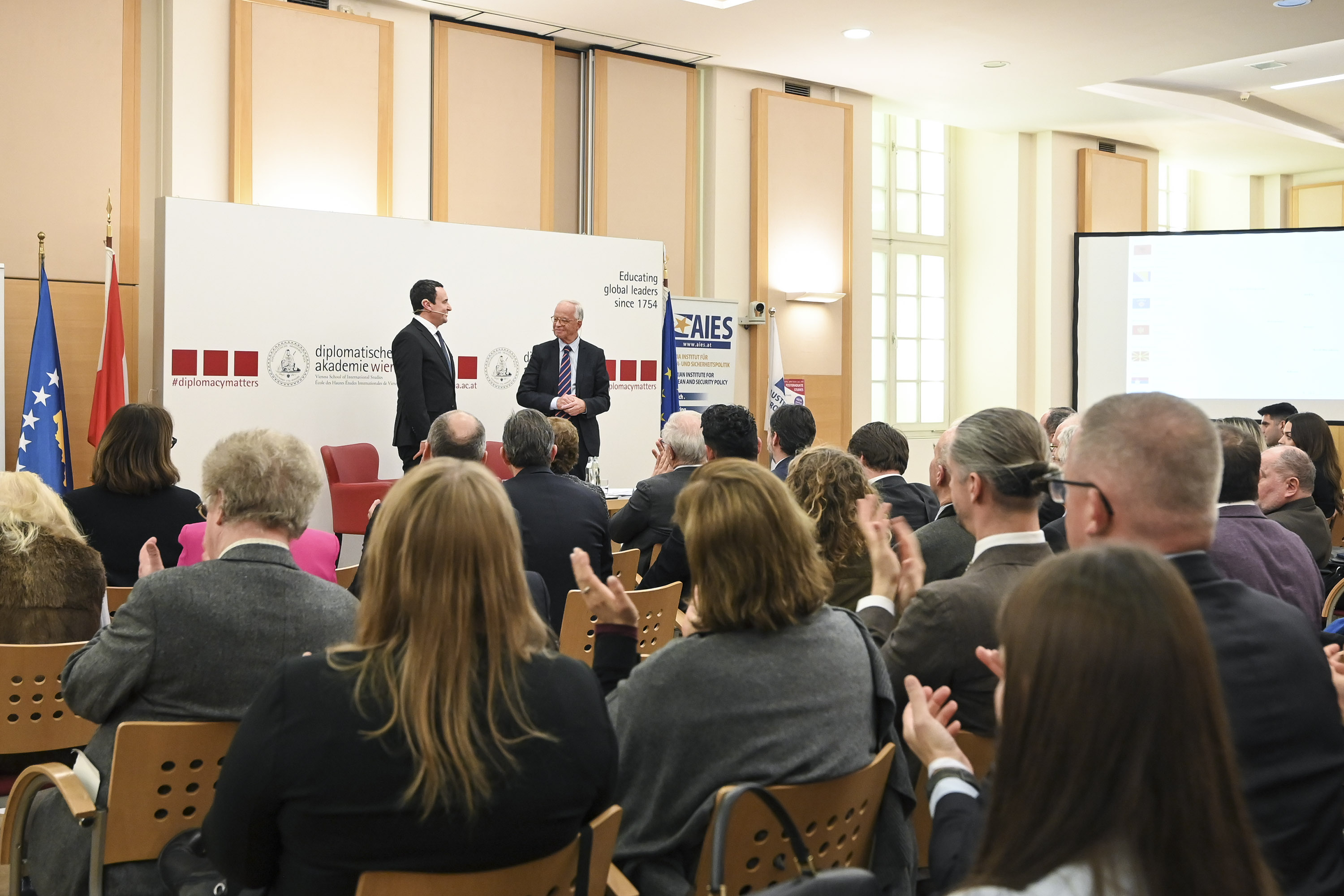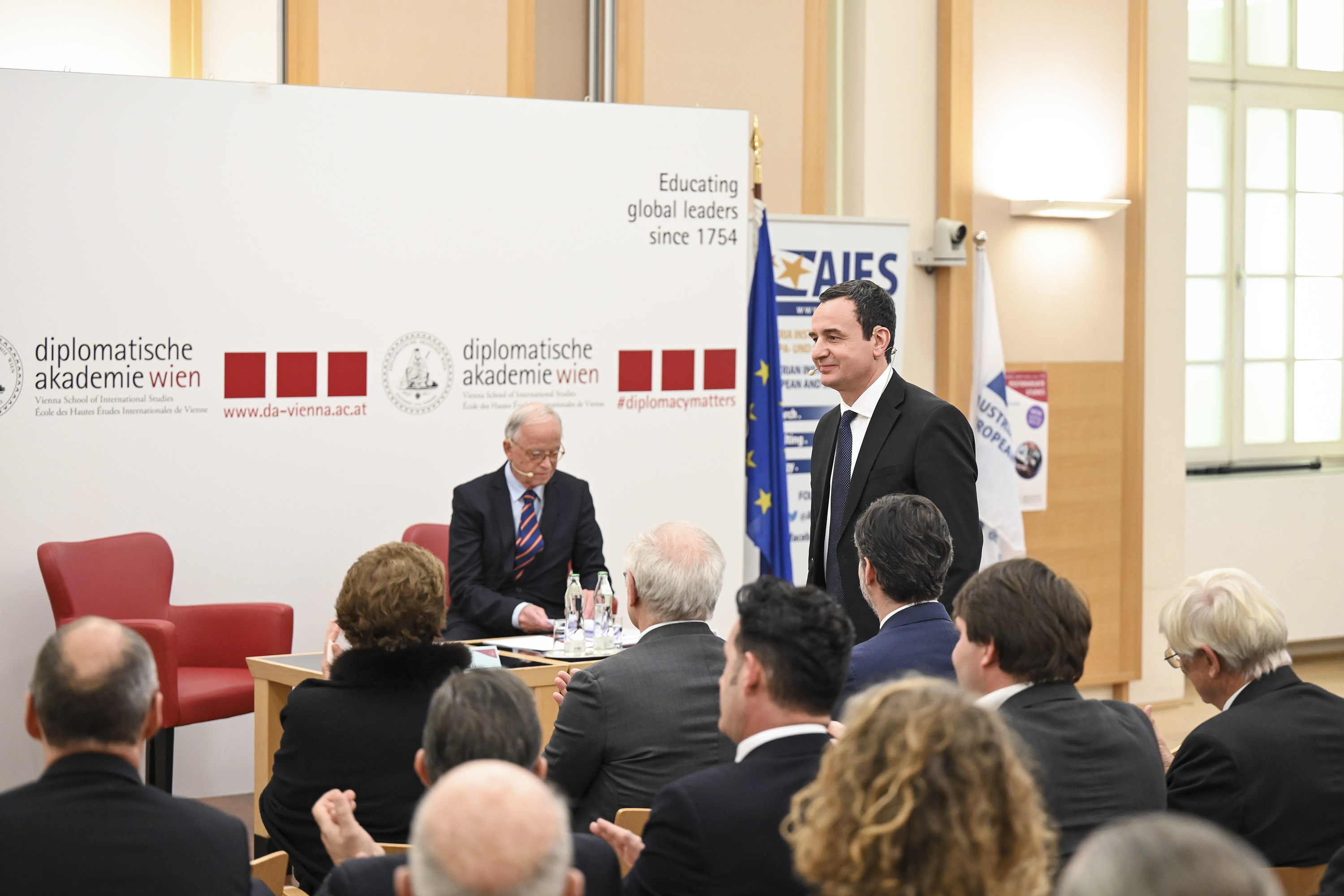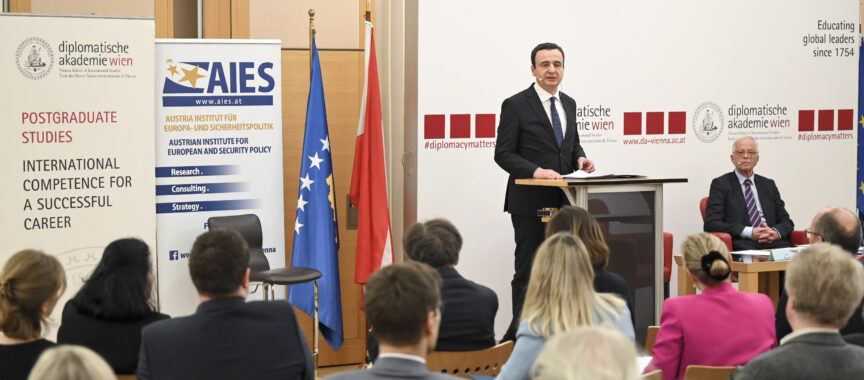12 January 2023, Vienna, Austria
Address of the Prime Minister of Republic of Kosova at the discussion “Western Balkans: A Central Piece to Lasting Peace in Europe” organized by the Austrian Institute for European and Security Policy, the Embassy of the Republic of Kosova in Austria, and the Diplomatic Academy of Vienna.
Dear Dr. Emil Brix, Director of the Diplomatic Academy of Vienna,
Dear Werner Fasslabend, President of the Austrian Institute for European and Security Policy,
Dear academics, diplomats, ambassadors and students,
I am honored to be here with you at the Diplomatic Academy of Vienna, where for two centuries, men and women have studied and researched and trained and had their journeys into their careers in international leadership.
Earlier today, with the honorable Chancellor Karl Nehammer, I mentioned that Vienna is known as the city of great composers and great thinkers alike, but Vienna is also the city of diplomacy which has hosted innumerable peace conferences and shaped historic dynamics.
I know that you have cooperation with our Ministry of Foreign Affairs and that many of our diplomats have been trained here. I am grateful for that and encourage increased cooperation in further training of our rather young diplomatic corps.
So, thank you for the opportunity to address you here today at this honorable institution.
That we are living in changing times, has already been established.
That which many feared and hoped wouldn’t happen, already has happened.
Russia invaded Ukraine, a democratic and peace-loving country that did nothing to provoke its neighbor.
This has had a profound impact on geopolitics and has ultimately shaken Europe out of complacency.
The Chancellor of Germany, Olaf Scholz, has already given a name to such a change. He calls it– Zeitenwende.
The war in Ukraine has left many commentators wondering, how did we get here?
While I don’t have the answers to all the difficult questions that have surfaced after Russia’s aggression in Ukraine and the renewed tensions in the Western Balkans, or South-East Europe for that matter, I will try to give my own view on why we find ourselves here and what is needed to get to a better place.
After the horrors of the Second World War and the Holocaust, Europe and the world vowed to “Never Again” allow such atrocities to happen.
Yet we saw genocide happening in Europe again; in Bosnia and Kosova and around the world; in Rwanda, Darfur, Iraq and Syria.
The Holocaust survivor and author Elie Wiesel said that: “Never Again” is a phrase that is much more than a slogan. “It’s a prayer, a promise, a vow… never again the glorification of base, ugly, dark violence.”
Coming from a contested region and war-torn country, I witnessed the destructive power of hate against our people which culminated in ethnic cleansing and genocide by Serbian forces.
Unavoidably we ask ourselves, why did it happen again? How could we allow genocide to happen again in Europe? The answer, as complicated as we tend sometimes to see it, I believe is rather simple.
It lies in the unwillingness to face the past and embrace the future and to distance from war criminals who committed genocide.
Instead, we see glorification of war criminals but also the glorification of an imperialist past, a return to times of territorial expansion, of past glory, of power and domination over others, which as we see in the case of Russian aggression in Ukraine, goes as far back as the Middle Ages.
It lies also in the inability to accept the other as an equal human being, seems obvious but it’s not as natural as it should be, to accept therefore one another’s existence and legitimate aspirations.
Such thinking leads to hatred for the other which then spills over into violence.
Ideological differences, race, age, religion or beliefs, language, gender and all that makes us different from one another are then exploited to portray the other as the enemy.
I do not believe that differences bring conflict, but their instrumentalization for political or economic gain turns them into conflict.
That is what we saw in the last century; this is what led to many wars and conflicts.
In the biggest part of Europe, the answer to such never-ending carnage was the birth of the European Community, now known as the European Union.
Sometimes it is easy to forget, but the European Union as a project of peace and historical process of cooperation among old adversaries was only possible after acceptance of responsibility for the war, after a meaningful repentance that led to the kneeling of a Chancellor and the embrace of true democracy.
So what does all this have to do with the Western Balkans, or lasting peace in Europe, one might ask?
I believe everything.
The main and the only reason why we still see tension in almost every Western Balkan country is because the aggressor, the one that initiated all the wars in former Yugoslavia, refuses to take responsibility. Instead of acknowledging and accepting its own role, wants to portray differences across the region as the source of conflict.
Almost 24 years after genocide in Bosnia and Kosova, Serbia doesn’t accept any crimes. It has never apologized nor taken any responsibility.
On the contrary, its current leadership, which was in power at the time of Milosevic, laments its territorial losses and considers war criminals as heroes.
In Serbia, in the Danube River, near Tekija village, a fisherman notices an object floating on the water. It is a piece of a truck. A diver is called and at the bottom of the river they find a slaughterhouse freezer truck. As they pull the truck out of water, human legs start falling from the back. They open the doors and inside they find 86 bodies, including three heads. Among them is the body of a little girl only 7 years old. While checking her belongings, they find her schoolbag. Inside the bag is a UNICEF notebook, wooden crayons and a little doll. In the notebook there were drawings of houses and flowers.
She was killed in Kosova, put in the slaughterhouse freezer truck and sank to the bottom of the river. After they found her, together with other bodies they load into another truck. To this day we don’t where they took those bodies. We don’t know the girls name, how she looked and who her parents are. She is among 1,617 forcefully disappeared persons.
While we know she will never return to the house and the flowers she painted, we will never see again with her, we will always tell her story and we will never rest until her fate is known. And we will always remember her and 1,133 children that were killed by Serbia during 1998-99.
Beneath a police shooting range in a Belgrade suburb, in Batajnica, just a walking distance from Belgrade’s ‘Republic Square’ the bodies of more than 744 Albanians were found in a mass grave.
Those bodies were buried in Kosova, then exhumed and transported to Serbia for secret reburial in an effort to hide evidence of war crimes. Among those bodies were forty-six members of the Berisha family; 14 of them under 15 years old, including two babies and a pregnant woman.
Near the mass grave, a new Serbian Orthodox Church has been built.
To this day, five mass graves, in Batajnica, Rudnica, Kizevak, Perućac and Petrovo Selo with a total of 950 bodies have been found in Serbia.
Yet, there isn’t a memorial plaque nor a single sign that indicates that there was a mass grave in all of these places.
Today, the perpetrator that committed genocide just a little more than two decades ago acts as a victim and denies the crimes.
Complete denial.
But we don’t forget. The story of a 7-year-old girl, killed, put in the slaughterhouse freezer truck and buried at the bottom of the Danube River, will not be forgotten.
Starting this month, until June when KFOR troops entered Kosova in 1999, almost every day we have memorials of massacres committed by Serbia.
So, for as long as the leadership in Serbia refuses to accept their past crimes, apologize for their wrongdoing, true and meaningful peace in the Western Balkans is still far from reach.
Instead of apologizing, Serbia continues to threaten its neighbors, interfere in their internal affairs and use ethnic minorities as a tool for destabilization instead of helping their integration.
Last century’s ambition for a “Greater Serbia” has now been changed to “Serbian World” policy, identical to the “Russian World” policy, in quest for hegemony and dominance.
And yet, despite all of this, the Republic of Kosova is constructively engaged in the dialogue with Serbia to seek normalization of relations.
At the Paris Peace Forum last year, I said that Kosova wants peaceful and good neighborly relations with Serbia, and that we are ready to extend our hand if they are ready to unclench their fist.
It is clearly not the lack of will from our side to move forward into a cooperative future, but the unwillingness of Serbia to distance itself from its past.
The question should be, why isn’t Serbia ready to accept responsibility, to apologize and extend the hand of reconciliation to the victims of its aggression?
Again, the answer is rather simple.
Serbia never fully transformed. It never meaningfully prosecuted and sentenced war criminals but instead became a safe haven for them.
The European Union on the other hand, instead of sanctioning Serbia’s threats and aggression towards its neighbors, has rewarded it with billions of EU investments and advancement towards EU membership.
What Serbia’s leadership understood is that to get EU money and advance towards EU membership, acceptance of responsibility and distancing itself from Milosevic was not a precondition.
In other words, it was possible for Serbia to get EU money while rejecting EU values. Today, Serbia is the only EU candidate country that has not sanctioned nor condemned Russian aggression in Ukraine.
To prove its mockery of its obligation to align with EU’s foreign policy, last September their Foreign Minister signed an agreement with Russia for mutual “consultations” while Russia continued its ruthless war in Ukraine.
I believe this is wrong.
I know many in Brussels expect from Kosova to deliver in the dialogue without questioning Serbia’s irrational demands, which goes contrary to the EU basic values.
In an attempt to be neutral towards Kosova’s status, they have become neutral towards Serbia’s aggression towards its neighbors and neutral towards Serbia’s disregard of EU values.
But we are doing our part. Kosova is ready for dialogue and it will seek normalization of relations with Serbia despite the latter’s malign intentions, because we believe that dialogue has no alternative.
But we engage with principles and are value driven. Not simply interest driven. Interest and values should not be decoupled.
We believe that dialogue is about mutual recognition.
Because mutual recognition between Kosova and Serbia and true democratization of the whole region brings sustainable peace in the Western Balkans and contributes to a lasting peace in Europe.
Meanwhile, we continue to strengthen the state of Kosova.
Although our continent continues to be the most democratic region, credible reports suggest that nearly half of democracies in Europe – a total of 17 countries – have suffered democratic erosion in the last five years. Meanwhile, at the world level, half of the world democracies are in retreat and the number of the countries moving toward authoritarianism in the last six years has more than doubled.
Kosova, on the other hand, has progressed in the last two years.
Last year we improved for 17 places on Transparency International on the fight against corruption and same (17 places) on World Press Freedom Index.
We were ranked 1st for the second time in the rule of law in the Western Balkans by the World Justice Project, and 2nd in the world for improvement in the past year.
We upgraded to group B from group C in the World Bank Government Tech Maturity Index for focus on digital governance.
And we had an increase of 17% in budget compared to the previous year. Our GDP growth was 4% after subtracting inflation. Exports increased by 23%, tax revenues by 22% without changing fiscal policy, custom revenues by 11% and FDI by 47%.
We submitted applications for membership both in the Council of Europe in May last year, and in the European Union a month ago, and we look forward to becoming members of NATO’s Partnership for Peace Program.
I am very pleased with Chancellor Nehammer’s warm welcome today and his commitment to support our application in the Council of Europe and the continued support for our integration process in the European Union.
We will work together to further strengthen our bilateral relations.
And Austria was among the first countries to recognize our diplomas at a period of great need for our citizens, during the apartheid of the ’90s, three decades ago.
About 70,000 citizens of Kosova, many of them who moved here from early ’70s till late ’90s to escape occupation made Austria their home.
They live, work and study here and have become our ambassadors and living bridges between our two countries and cultures.
We are very grateful for this bond and we are looking forward to deepening and strengthening our friendly relations even more, in every aspect.
Next month, we will celebrate the 15th anniversary of the Declaration of Independence of the Republic of Kosova.
We are indebted to many Austrian diplomats and activists from Erhard Busek to Albert Rohan who contributed in our liberation struggle and our independence process.
Thank you for this opportunity.
Last modified: January 14, 2023
